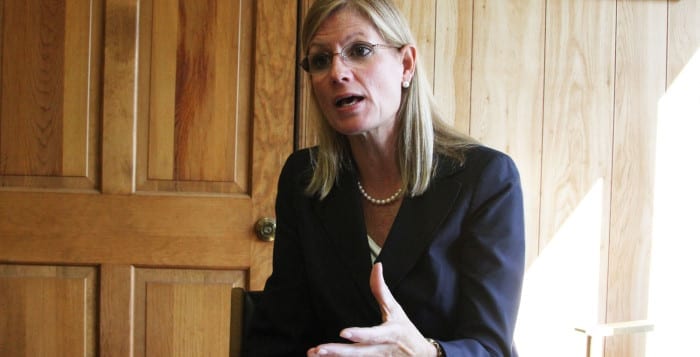One-on-one with Jane Bonner
Brookhaven Town councilwoman rolls up her sleeves in District 2

Town of Brookhaven Councilwoman Jane Bonner (R-Rocky Point) has served her community for decades. In an exclusive interview, she discussed her journey into local politics, her approach to commercial redevelopment, efforts to protect the environment and the upcoming redistricting process.
What is your professional background and how did you end up at Town Hall?
I moved to Rocky Point 34 years ago. I became very active locally in the Rocky Point Civic Association, the Rocky Point school board, St. Anthony’s [Catholic Youth Organization]. I was very involved in the community, volunteering and generally trying to make things better. I was sort of a person who didn’t ask others to do things for me — if I wanted it done, I rolled my sleeves up.
When [town] Highway Superintendent Dan Losquadro [R] was running for the Suffolk County Legislature, he reached out and asked if I would volunteer for his campaign. I knew him, I liked him, and I believed in what he stood for and I got involved in his campaign. He liked my work on his campaign and he hired me to be a legislative aide. I was quite shocked by the offer. Then I worked in his office for four years, always staying actively involved.
Former Councilman Kevin McCarrick [R-Rocky Point], who was the first representative for Council District 2, ran for two terms but was very busy in his private business — the family owned McCarrick’s Dairy. He was busy at the dairy and he decided he needed to devote his time to the family business and didn’t want to run for office anymore. I was asked by the Republican Party, the Conservative Party and the Independence Party to run for this position, with others also screened as well. And they picked me.
What initially drew you to the Rocky Point community?
My first husband and I were looking to buy a house that we could afford. I grew up in Northport; he grew up in Forest Hills but was living in Centerport when I met him. We got married, had children … and had my daughter. We were renting a house in Centerport. This was when the market had really, really peaked. I had friends who had a house out here. My first husband summered out in Wading River. And 34 years later, I’m in the same house.
What is it about this area that makes it unique?
There’s a very strong sense of community, of friendliness and neighborliness, of helping each other out. I’m always in awe of the strong number of volunteers that are in every hamlet that I represent.
I have a very healthy respect for people that volunteer. We live in a chaotic time now where people are being pulled in many different directions — and people are having to work harder because their dollar is worth less. I enjoy the job that I have because I meet wonderful people and the volunteers that I meet at civic meetings, at Great Brookhaven Cleanups, at scouting.
Where I live in Rocky Point, specifically, it still has a touch of how it used to be. I live in the old section, the North Shore beach section, so most of the bungalows have been renovated, but they’re not cookie-cutter, not a development. Every house is a little bit different. It’s a charming community.
What is your approach, your guiding philosophy, toward commercial development and downtown beautification?
Various levels of government have worked very hard to bring redevelopment to Sound Beach — the playgrounds and the veterans monument. We’ve brought money to downtown Rocky Point, 25A and Broadway specifically – sidewalks, streetlights, street trees, the veterans square that we developed, working with business owners to come into whatever hamlet that I represent.
Commercial development — not large-scale commercial development, not a big-box store, nothing like that — is about working hard with our local stores to help them succeed, whether that’s with permits or meeting with them to help them get through the process with the town, county or state. We kind of view the office as a clearing house. Even if it’s not under my purview, we help. We sort of roll our sleeves up and guide them through the process and stay in touch throughout the process.
What is your office doing to protect the environment?
We rebuilt two new jetties last year — east and west jetties down at Cedar Beach. The inlet had filled in and it was a navigational hazard. At the back of the harbor, the water was not flushing well and there were water quality issues down there. Former [state] Sen. [Ken] LaValle [R-Port Jefferson] jumpstarted us with a $3 million grant from the state and then we paid $5 million. Now the back of the harbor is so clear and clean. The fish are coming back like crazy.
We’ve done a significant amount of stormwater drainage and infrastructure investment along the North Shore. During Hurricane Sandy, much of our stormwater infrastructure was destroyed. So the highway superintendent and our finance department and our department of environmental protection worked hand in hand with FEMA to capture many millions of dollars so that we could bring back a greater standard to our stormwater infrastructure.
Can you summarize the upcoming redistricting process for the Town Council?
We undertake this every 10 years. Residents should definitely partake in the meetings. Years ago, when I first ran for office, I represented more of Port Jeff Station and more of Coram. When we redistricted 10 years ago, I lost portions of Port Jefferson Station to try to keep it contiguous to the Comsewogue school district. I lost portions of Coram to keep it contiguous with other electoral districts that it touched.
I invite residents to participate in the process. We have a board that we’ve selected — there is a requirement for specific political parties, so there are equal seats at the table for each party. And they make the decisions on how the maps are going to roll out and how the boundaries will change. We [the Town Council] vote on the redistricting plans that the appointed board makes.






